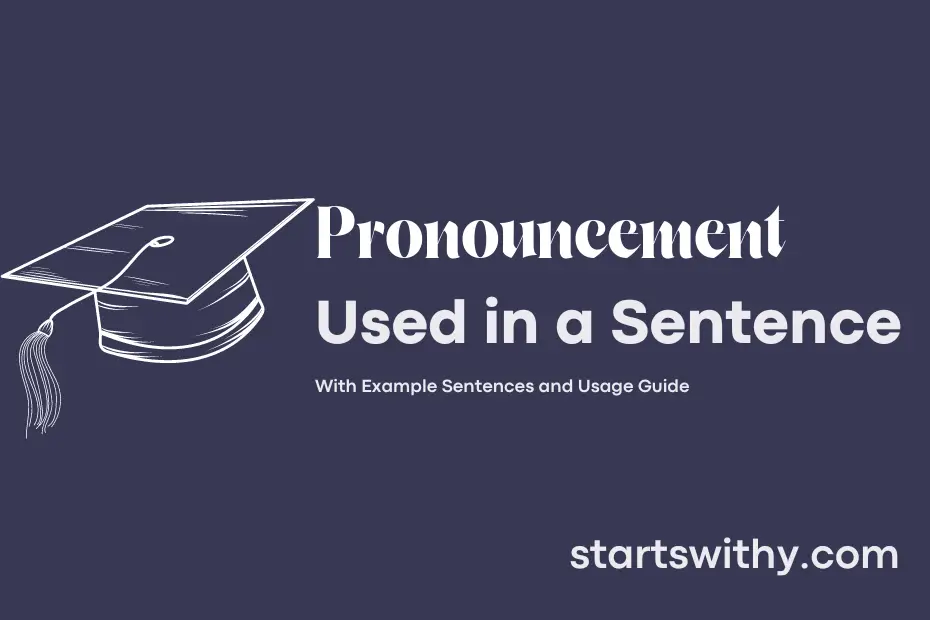Have you ever wondered what a pronouncement actually is? In simple terms, a pronouncement can be defined as an authoritative or official statement or announcement made by a person in a position of power or authority.
Pronouncements can come in various forms, such as declarations, verdicts, or official statements issued by government officials, judges, or leaders. These statements carry weight and significance, often influencing decisions, policies, or public opinion.
7 Examples Of Pronouncement Used In a Sentence For Kids
- The teacher’s pronouncement made everyone sit quietly.
- We all clapped after the pronouncement was made.
- The pronouncement said we’ll have a holiday tomorrow.
- Everyone smiled after hearing the pronouncement.
- We cheered loudly when the pronouncement was made.
- The pronouncement was so exciting, we all laughed.
- We all followed the pronouncement happily.
14 Sentences with Pronouncement Examples
- Pronouncement on the cancellation of exams has caused confusion among college students.
- Students eagerly awaited the pronouncement of the academic calendar for the upcoming semester.
- The college administration made a significant pronouncement regarding the implementation of online classes.
- The sudden pronouncement of a fee hike created unrest among students across campus.
- The final pronouncement on the rescheduling of practical exams was received with relief by many students.
- The pronouncement of a strict attendance policy left many students worried about their future.
- The delay in the pronouncement of results led to frustration among the students.
- The controversial pronouncement by the college principal sparked debates among the student body.
- The pronouncement of a new scholarship program brought hope to many underprivileged students.
- The clear pronouncement of deadlines for assignments helped students plan their work effectively.
- The pronouncement of a guest lecture by a renowned professor excited students across all departments.
- The sudden pronouncement of a campus closure due to protests caught many students off guard.
- The pronouncement of a collaboration with an international university opened up new opportunities for students.
- The lack of proper communication led to confusion about the pronouncement of examination dates.
How To Use Pronouncement in Sentences?
To use the word pronouncement in a sentence, one must keep in mind its meaning and usage. A pronouncement refers to a formal or authoritative statement made by a person in a position of power or expertise.
To incorporate the word pronouncement into a sentence, one could say, “The CEO’s pronouncement regarding the company’s new direction was met with mixed reactions from the employees.” In this sentence, the word pronouncement is used to describe the formal statement made by the CEO.
When utilizing the word pronouncement in writing or conversation, it is important to ensure that it fits logically within the context of the sentence. This will help to convey the intended meaning clearly to the reader or listener.
Additionally, it is useful to vary the words and phrases used in connection with pronouncement to avoid repetition and enhance the overall quality of the sentence. Synonyms like declaration, announcement, proclamation, or statement can be used interchangeably to maintain fluency in writing or speaking.
By following these guidelines and practicing the proper use of the word pronouncement, beginners can effectively incorporate it into their vocabulary and communicate more effectively in various contexts.
Conclusion
In conclusion, sentences with pronouncement are declarative statements that assert or declare something as a fact or opinion. They are straightforward in nature, often used to make a definitive statement or declare a decision. These types of sentences play a crucial role in communication, as they convey information clearly and confidently.
Whether delivering a formal announcement, sharing personal beliefs, or stating a judgment, sentences with pronouncement leave no room for ambiguity and are meant to leave a lasting impression on the listener or reader. Their directness and assertiveness make them powerful tools for conveying ideas effectively and decisively in various contexts.



